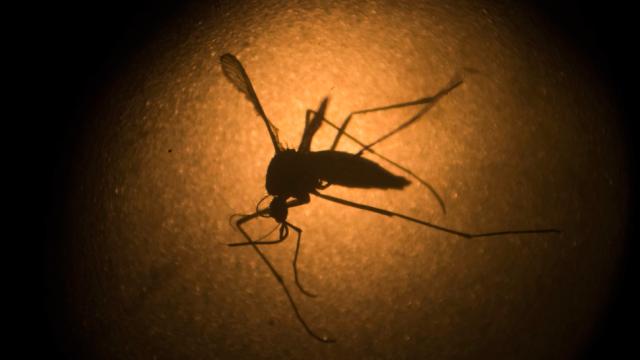The US Centres for Disease Control has released a sobering new study detailing the birth defect rates among pregnant American women infected by the Zika virus. It’s as bad as we feared.
Image: AP
The CDC Vital Signs study is the first comprehensive analysis of Zika-infected pregnant women entered into the US Zika Pregnancy Registry (USZPR) from January 15 to 27 December 2016. The analysis, which involved nearly 1300 pregnancies with suspected Zika infections across 44 US states, shows that one in 10 pregnant women infected with Zika had either a fetus or a baby with birth defects. That’s an alarming rate — and a reminder of just how dangerous Zika can be to a developing fetus.
The CDC report focused solely on completed pregnancies, whether those pregnancies ended with a live birth, stillbirth, miscarriage or termination. Of the 1297 women entered into the database, only 972 ended their pregnancies — through birth, miscarriage, stillbirth or abortion — within the timeframe analysed. Of those, Zika-related birth defects were reported in 51 of the pregnancies, or five per cent. But when the researchers considered only lab-confirmed cases of Zika infections (as opposed to suspected infections), that number rose to 10 per cent.
The proportion of fetuses or babies with Zika-related defects were highest among mothers who were infected by the virus during their first trimester of pregnancy.
The researchers did not include data from pregnant women in Puerto Rico. This US territory, which has recorded 37,000 cases of Zika since 2015, maintains its own Zika registry.
“Zika continues to be a threat to pregnant women in the United States,” said CDC Acting Director Anne Schuchat at a news conference held earlier today. “With warm weather, a new mosquito season and summer travel rapidly approaching, prevention is crucial to protect the health of mothers and babies.”
Zika is a mosquito-borne disease that causes a fever and flu-like symptoms among those infected, and it’s rarely fatal. But in developing fetuses, the virus is known to cause abnormally small heads, vision problems, central nervous dysfunction, and other physical and cognitive defects.
Zika isn’t attracting much media or public attention at the moment, and the World Health Organisation has said it isn’t a health emergency any more, but the threat is still very much real, both in and outside of the US.
The vast majority of Zika infections in the US are travel-related, but the disease can be spread through sexual contact as well. Last summer in the US, Zika was locally active, that is, spreading via mosquitoes, in certain parts of southern Florida and Texas. There’s an excellent chance that Zika will return to the US later during summer in the country, and given the warm, wet winter, mosquitoes will likely be out in full force. The CDC advises that pregnant women, regardless of their stage in pregnancy, avoid areas in which the virus is active.
Thankfully, we do have some good news to report: Scientists have finally started a mid-stage trial of a vaccine. It will take some time and ingenuity, but we’ll eventually overcome this scourge.
[CDC]
